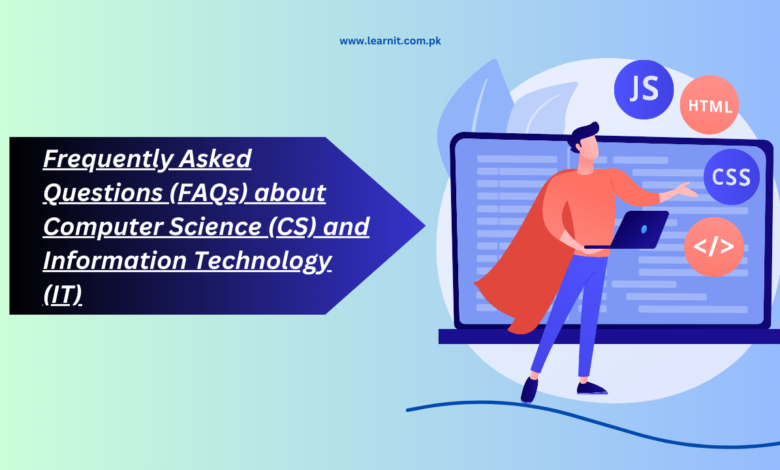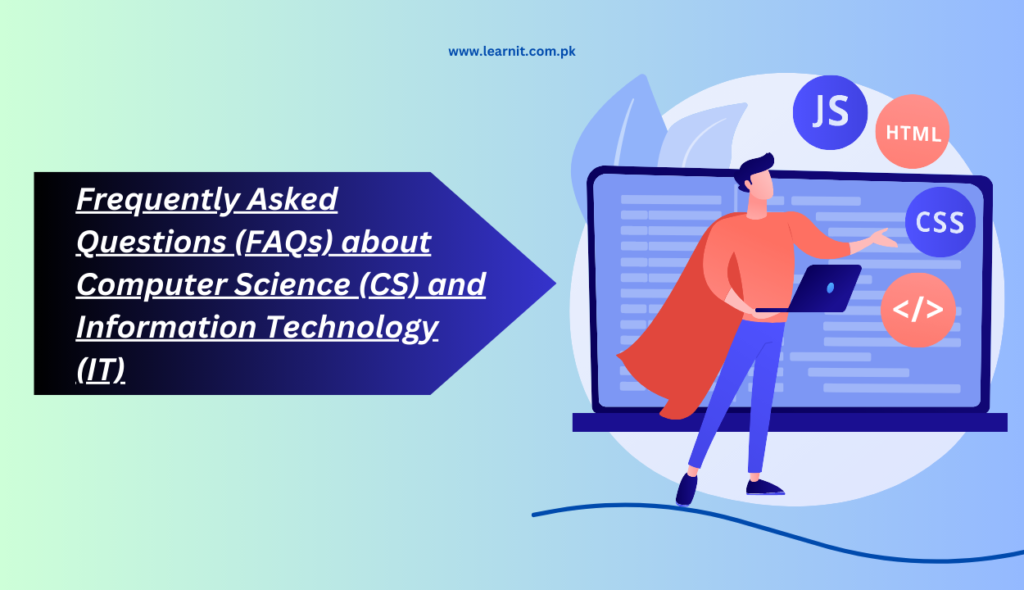Frequently Asked Questions (FAQs) | Computer Science (CS) | Information Technology (IT)

Frequently Asked Questions (FAQs) about Computer Science (CS) and Information Technology (IT) cover a wide range of topics related to these fields. Here are some common questions and their answers:
1. What is the difference between Computer Science and Information Technology?
Computer Science (CS) is a broader field that focuses on the theory and algorithms behind computing, including programming, data structures, algorithms, and the mathematical foundations of computation. Information Technology (IT) is more application-oriented and deals with the practical aspects of using technology to manage and process information.
2. What career opportunities are available in CS and IT?
Both fields offer a diverse range of career opportunities. In CS, you can become a software developer, data scientist, artificial intelligence specialist, computer scientist, or pursue a career in academia. In IT, you can become a network administrator, IT consultant, cybersecurity analyst, system administrator, or work in tech support.
3. What skills are important for a career in CS or IT?
Common skills for CS include programming (e.g., Java, Python, C++), data structures, algorithms, problem-solving, and a solid understanding of computer theory. In IT, important skills include networking, system administration, cybersecurity, database management, and knowledge of specific software and hardware systems.
4. Do I need a degree to work in CS or IT?
While a degree can be beneficial, especially for certain roles and companies, it’s not always a strict requirement. Many successful professionals in CS and IT have gained knowledge and skills through self-study, coding bootcamps, online courses, and practical experience. However, some specialized roles and larger organizations may prefer or require a degree.

5. How can I stay updated with the latest developments in CS and IT?
Both fields evolve rapidly. To stay updated, follow industry news, read technical blogs and forums, attend conferences and webinars, take online courses, participate in open-source projects, and engage with a community of professionals.
6. Is there a demand for professionals in CS and IT?
Yes, there is a significant demand for skilled professionals in both fields, with continued growth expected. The increasing reliance on technology, data, and digital solutions across industries has created a sustained demand for CS and IT experts.
7. What’s the role of AI and Machine Learning in CS and IT?
AI and Machine Learning are becoming increasingly important in both CS and IT. They are used in various applications, such as data analysis, automation, natural language processing, and pattern recognition. Understanding AI and Machine Learning can enhance job prospects in many technology-related roles.
8. How can I start learning CS or IT?
There are many resources available for beginners. You can start with online coding platforms, MOOCs (Massive Open Online Courses), programming tutorials, and introductory books. Consider joining local tech meetups or online communities to connect with others and learn from their experiences.
9. What ethical considerations are relevant in CS and IT?
Ethics in CS and IT are crucial, especially in areas like data privacy, cybersecurity, AI, and automation. Professionals in these fields should be aware of the potential societal impacts of their work and strive to make responsible and ethical decisions.
Related:
10. Can I switch careers to CS or IT if I come from a non-technical background?
Yes, many people successfully transition to careers in CS or IT from non-technical backgrounds. It may require extra effort and dedicated learning, but with determination, you can acquire the necessary skills and find opportunities in these fields.
11. What career paths can I pursue with a degree in Computer Science?
A degree in Computer Science opens doors to diverse career paths. You can become a software engineer, working on applications, or a data scientist, analyzing and interpreting data. Other options include becoming a web developer, computer scientist, artificial intelligence specialist, or even pursuing research and teaching roles in academia.
12. How does Information Technology impact businesses?
Information Technology plays a critical role in modern business operations. It helps streamline processes, manage data, enhance communication, and improve customer experiences. IT professionals ensure that systems are secure, data is accessible, and technology aligns with business goals, making them indispensable for companies of all sizes.
13. Are certifications valuable in CS and IT?
Yes, certifications can add significant value to your CS or IT career. Certifications validate your skills and knowledge in specific areas like cybersecurity (CISSP, CompTIA Security+), cloud computing (AWS, Azure), networking (Cisco CCNA), and more. They can make your resume stand out and may be required by some employers.
14. How can I specialize in cybersecurity within IT?
To specialize in cybersecurity, start by learning the fundamentals of networking and system administration. Then, pursue certifications like CompTIA Security+ or Certified Information Systems Security Professional (CISSP). Engage in hands-on practice, stay updated on the latest threats, and consider pursuing more advanced certifications as you gain experience.
15. What is the future of CS and IT?
The future of CS and IT is exciting and full of opportunities. Emerging technologies like quantum computing, edge computing, and further advancements in AI and Machine Learning will drive innovation. Cybersecurity will continue to be crucial as digital systems expand. Staying adaptable, continuously learning, and embracing new technologies will be essential to thriving in the evolving tech landscape.
16. Can I work remotely in CS or IT?
Yes, remote work is becoming increasingly common in both CS and IT. Many tech companies offer remote positions, especially for roles that can be done online, such as software development, data analysis, and certain IT support roles. However, the availability of remote work may vary depending on the company and role.
17. What soft skills are important in CS and IT?
In addition to technical skills, soft skills are vital. Communication skills help convey complex technical ideas to non-technical stakeholders. Problem-solving and critical thinking are crucial for addressing challenges. Adaptability, teamwork, and time management are also valuable, given the dynamic nature of technology projects.
18. Are internships important for CS and IT students?
Yes, internships are valuable for gaining real-world experience, building connections, and improving your resume. They provide a practical understanding of how the industry works, allow you to apply classroom knowledge, and often serve as a stepping stone to full-time employment.
19. Can I transition to a management role in CS or IT?
Yes, many tech professionals transition to management roles. Developing a deep understanding of your field, gaining experience, and acquiring leadership skills are essential. Consider pursuing an MBA or management-focused courses to complement your technical expertise.
20. How does the tech industry contribute to sustainability?
The tech industry has a significant role in sustainability efforts. Through innovations like energy-efficient hardware, renewable energy solutions, and AI-driven optimizations for resource management, the tech industry can positively impact the environment. Additionally, tech solutions in transportation, smart cities, and agriculture can contribute to sustainable development.

Hello team,
I am representing a full-service Search Engine Optimization (SEO) Agency, that delivers high-quality Service’s to your needs at lowest prices.
Google-certified SEO professional service for your website : – learnit.com.pk
SEO – ( Full SEO Packages with plan and activities).
SMO – ( Facebook , Twitter, LinkedIn, YouTube & My Space, Marketing, Etc.).
Please get back to us in order to discuss the possibility in further detail with Our SEO Experts.
Regards,
Monarch – Head Digital Marketing